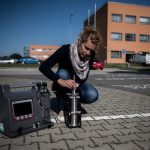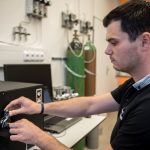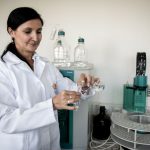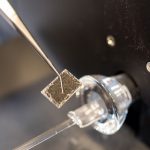Doctoral students are devising a strategy to reduce dust in city streets
 Air Quality
Air Quality
 Sustainable Urban Mobility
Sustainable Urban Mobility
A team of doctoral students at Ostrava’s Technical University – led by 29-year-old Barbora Švédová – is developing cutting-edge technologies that will reduce dust levels in city streets.
The young scientists will apply their knowledge of the mineral content of dust particles to design a method based on particle adhesion; this will make it possible to devise improvements to street cleaning processes, including the use of chemical agents that will help remove dust particles from surfaces more quickly and effectively.
The City of Ostrava will then be able to incorporate the improvements into its existing street cleaning systems.
- Barbora Švédová works with an ELPI+ cascade impactor, which is used to take dust samples from the air and sort them by size.
- Marek Kucbel with equipment for analyzing organic and elemental carbon.
- Silvia Bieleszová from the Technical University’s Institute of Geological Engineering is helping the team with the dust analyses; key equipment includes an ion chromatograph.
- An Innov-X DELTA Professional mobile X-ray fluorescence spectrometer is used to analyze dust particles.
- Samples from filters used to collect PM10 particles from the air for analysis of organic and elemental carbon.
The city already carries out street cleaning more frequently than the law requires, but the project will help to achieve further improvements. Barbora Švédová is currently doing her second doctorate at the Faculty of Mechanical Engineering while also working at the University’s ENET Centre, which carries out research into energy transformation technologies. She gave more details about the project: “First, it is important to find out what percentage of dust particles is emitted by transport. We are currently studying which particles are created by abrasion (from mechanical wear of roads and tyres), which particles come from the erosion of building materials, and which particles are generated by chemical processes – such as those from exhaust gases. We will also study the difference between road dust in the summer and winter. The data from analyzing the particles will enable us to recommend measures for reducing road dust levels. Finally we will evaluate the effectiveness of road cleaning with regard to specific types of dust particles.” The ultimate goal of the team’s work is to help improve the urban environment.
Švédová has received funding from the Moravian-Silesian Region which enables her to focus on her research. Last year she also attended a summer school on research project design and funding applications, organized by the Technical University for its own students and partners from Slovakia.








